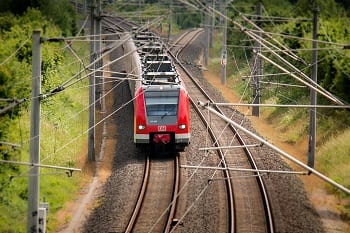Alstom unveils new train powered by a hydrogen fuel cell
November 1, 2016Railway industry continues to focus on clean technology in order to power trains
The railroad industry is already very familiar with electric transportation. Trains throughout the world are powered by batteries, as well as conventional energy solutions, but soon these trains could be powered by hydrogen fuel cells. Fuel cells have begun to establish a strong presence in the public transportation space. These energy systems have garnered acclaim because of their high efficiency and their performance capabilities.
New train to enter service in Germany at the end of 2017
Alstom, rail-equipment manufacturer based in France, believes that hydrogen fuel cells may be the future of transport via train. The company has unveiled its first hydrogen-powered train, which is called the Coradia iLint. It is based on an existing train model that Alstom has already developed. Alstom plans to put the new hydrogen-powered train into service in December of 2017. The train will initially be launched in Germany, where a comprehensive hydrogen fuel infrastructure has been taking form.
Alstom will offer maintenance and installation services to its customers
 Not only will Alstom be offering a hydrogen-powered train, the company will also offer its customers maintenance service for these trains. Alstom will also aid in the installation of new hydrogen fuel stations, which will be used to power the trains. When Alstom’s new train begins service in Germany, the hydrogen fuel it consumes will be produced through the consumption of waste products generated by the local chemical industry.
Not only will Alstom be offering a hydrogen-powered train, the company will also offer its customers maintenance service for these trains. Alstom will also aid in the installation of new hydrogen fuel stations, which will be used to power the trains. When Alstom’s new train begins service in Germany, the hydrogen fuel it consumes will be produced through the consumption of waste products generated by the local chemical industry.
Hydrogen fuel continues to gain prominence in the public transit space
Hydrogen fuel has been gaining prominence in Germany. In 2014, three German states expressed their interest in using hydrogen-powered trains. This interest has not been ignored by railway companies, which are growing more invested in hydrogen fuel cells. The attraction to fuel cells has been growing due to increasing emission regulations coming from prominent governments throughout the world. Fuel cells produce no harmful emissions and consume hydrogen fuel in order to generate electricity.

 HFN News is your leading source for fresh hydrogen and renewable energy updates. Amid the fast-paced growth of hydrogen companies, we provide top-notch news and insights about this exciting sector. Our coverage spans from hydrogen cars to global sustainable initiatives, and we highlight the latest in green jobs and developing hydrogen hubs. We invite you to share your local hydrogen news and explore today’s renewable energy job listings on our site. Thanks for choosing HFN News as your trusted guide to the hydrogen and renewable energy world!
HFN News is your leading source for fresh hydrogen and renewable energy updates. Amid the fast-paced growth of hydrogen companies, we provide top-notch news and insights about this exciting sector. Our coverage spans from hydrogen cars to global sustainable initiatives, and we highlight the latest in green jobs and developing hydrogen hubs. We invite you to share your local hydrogen news and explore today’s renewable energy job listings on our site. Thanks for choosing HFN News as your trusted guide to the hydrogen and renewable energy world!